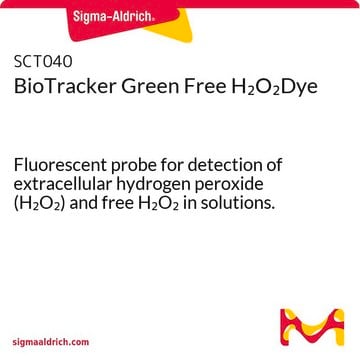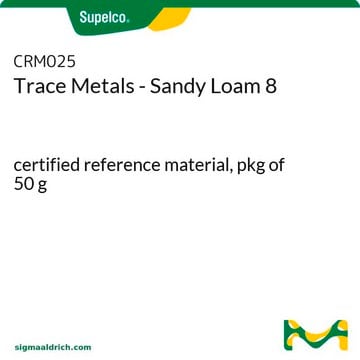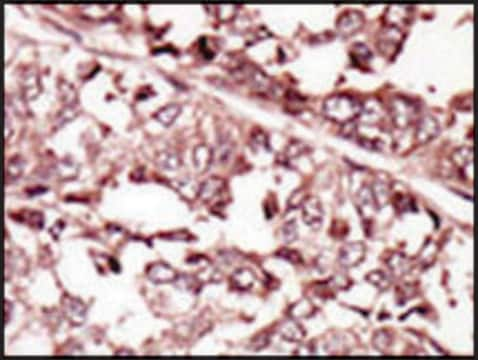MAK164
Intracellular Hydrogen Peroxide Assay
sufficient for 200 fluorometric tests (green fluorescence)
Synonym(s):
Hydrogen Peroxide Detection in Cells
Sign Into View Organizational & Contract Pricing
All Photos(2)
About This Item
Recommended Products
usage
sufficient for 200 fluorometric tests (green fluorescence)
detection method
fluorometric
relevant disease(s)
aging/geriatric diseases; neurological disorders; pulmonary disorders; orthopedic diseases; cardiovascular diseases
storage temp.
−20°C
General description
Hydrogen peroxide, a reactive oxygen species produced through the metabolism of molecular oxygen, serves as both an intracellular signaling messenger and a source of oxidative stress. Hydrogen peroxide is generated in cells via multiple mechanisms such as the NOX-mediated ROS production by neutrophils and macrophages (respiratory burst) or by the dismutase of superoxide anions produced as a result of electron leak during mitochondrial respiration. Abnormal hydrogen peroxide production contributes to oxidative cell damage and the progression of diseases such as asthma, atherosclerosis, osteoporosis, and neurodegeneration.
Application
Intracellular hydrogen peroxide assay kit has been used to measure intracellular hydrogen peroxide levels.
Features and Benefits
Compatible with high-throughput handling systems.
Suitability
This kit is suitable for the detection of hydrogen peroxide in living cells and a variety of samples such as cell extracts and liquids.
Principle
The Intracellular Hydrogen Peroxide Assay Kit provides a simple and reproducible method to quantify hydrogen peroxide levels in living cells and in a variety of other samples such as cellular extracts. This kit utilizes a unique cell-permeable sensor that generates a fluorescent product (λex = 490/λem = 520 nm) after reaction with hydrogen peroxide that can be analyzed by a fluorescent microplate reader, flow cytometer, or fluorescent microscope.
Storage Class Code
10 - Combustible liquids
WGK
WGK 3
Choose from one of the most recent versions:
Already Own This Product?
Find documentation for the products that you have recently purchased in the Document Library.
Customers Also Viewed
Carmen Sarcinelli et al.
Archaea (Vancouver, B.C.), 2016, 7424870-7424870 (2016-10-19)
Peroxiredoxins (Prxs) are ubiquitous thiol peroxidases that are involved in the reduction of peroxides. It has been reported that prokaryotic Prxs generally show greater structural robustness than their eukaryotic counterparts, making them less prone to inactivation by overoxidation. This difference
Qing You et al.
Advanced science (Weinheim, Baden-Wurttemberg, Germany), 7(17), 1903341-1903341 (2020-10-01)
Multifunctional nanoplatforms for imaging-guided synergistic antitumor treatment are highly desirable in biomedical applications. However, anticancer treatment is largely affected by the pre-existing hypoxic tumor microenvironment (TME), which not only causes the resistance of the tumors to photodynamic therapy (PDT), but
Nanna Cornelius et al.
Mitochondrion, 34, 103-114 (2017-03-07)
Spinocerebellar ataxia type 2 (SCA2) is a rare neurodegenerative disorder caused by a CAG repeat expansion in the ataxin-2 gene. We show increased oxidative stress, abnormalities in the antioxidant system, changes in complexes involved in oxidative phosphorylation and changes in
Dongdong Wang et al.
iScience, 9, 14-26 (2018-10-28)
Therapeutic effects of photodynamic therapy (PDT) remain largely limited because of tumor hypoxia. Herein, we report safe and versatile nanocatalysts (NCs) for endogenous oxygen generation and imaging-guided enhanced PDT. The NCs (named as PSP) are prepared by coating Prussian blue
Robert B Rosenblatt et al.
Theranostics, 11(2), 602-613 (2021-01-05)
Mechanical forces from non-ablative pulsed focused ultrasound (pFUS) generate pro-inflammatory tumor microenvironments (TME), marked by increased cytokines, chemokines, and trophic factors, as well as immune cell infiltration and reduced tumor growth. pFUS also causes DNA damage within tumors, which is
Our team of scientists has experience in all areas of research including Life Science, Material Science, Chemical Synthesis, Chromatography, Analytical and many others.
Contact Technical Service










